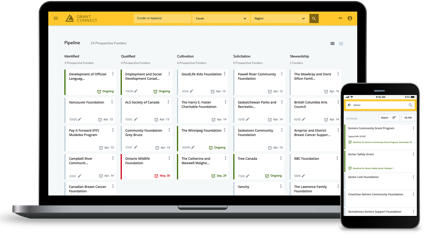Most nonprofits – particularly Black-led, Black-focused, and Black-serving organizations, groups, and networks (B3s) – operate in precarious financial positions. Many are faced with capacity and system-related barriers, as well as increasing demands for accountability and unrealistic expectations for demonstrating impact.
Before COVID-19 hit, many B3s were already reeling from the shrinking pool of funding opportunities and struggling to find funders to support the important work they do in their communities. Even with good ideas that aim to address real communities’ needs, many find it difficult to compete with mainstream nonprofits due to a lack of staffing capacity to prepare strong funding applications. Funding requirements associated with granting processes also pose insurmountable barriers. This prevents B3s from successfully competing for access to funding, capacity-building supports, and other resources to advance their mission.
“These challenges and barriers are systemic in nature and require system-level intervention.”
COVID-19 exacerbated pre-existing challenges and barriers B3s faced, and severely hampered their ability to sustain their work and serve their communities. Even when NABC and its allies worked with B3s and advocated for removal of some of the barriers in the granting process (e.g., COVID-19 emergency response funding), the challenges remained.
NABC continues to work with B3s and their allies to advocate and work for system-level change (e.g., Strengthening B3s, Advocating for Core Funding, Systems Change, and Promote Smart Grantmaking). These efforts require long-term and continuous commitment to help transform the funding environment. Building the capacity of B3s is a critical part of this transformation.
Here are some grounding perspectives B3s need to think about when seeking and writing grants:
- Align priorities. When applying for grants, it is critical to understand the funder’s key priorities and goals before investing precious time and energy into the grant writing process. Alignment of the grant idea, the organization’s mission, and the funder’s goals is important for the funding partnership to start on strong footing.
- Collaborate. For a funding partnership to be effective, the relationship must shift from transactional to transformational. B3s and funders must first come together to understand community needs and assets, and collectively propose solutions to address the need – then decide how much funding/resources will be needed to implement proposed solutions.
- Be mission-directed. Regardless of size and history, B3s are a means to an end. While the means is equally important, the primary focus of seeking funding should be to meet the needs of communities served. It is important to guard against mission drift and chasing funding. Mission-directed work is more likely to lead to successful and effective funding partnerships and transformative relationships.
- Think long-term. When applying for grants, think about sustainability and demonstrate that the work will continue beyond the funding relationship. Systemic challenges in grantmaking prevent B3s from long-term planning. Regardless, it is still important for B3s to have an orientation of sustainability that goes beyond dollars and cents.
- Take financial reporting seriously. Reporting can be an opportunity for B3s to meet accountability and learning requirements for internal and external stakeholders. Funders require financial reporting to know how funding is being used, and B3s must have and follow their own financial management policies and procedures for internal and external accountability requirements. Managing finances properly and transparently and assessing the impact of funding (telling the evaluation story) are critical aspects of reporting.
- Create a learning culture. Developing a culture of learning and reflection allows B3s to get critical feedback about what works, what doesn’t work for whom and why, and what they need to do to improve their work. This is critical in shifting relationships with funders and contributes to transformational change in funding partnerships and relationships.
- Stay curious. Learning that emerges from the work of B3s should be understood as a measure of accountability. When B3s are partnering with funders to propose solutions to address needs, they are testing assumptions/theories to see what works and how it can be scaled up. When a proposed solution fails, important lessons are learned. It is through ongoing reflective practice that lessons learned can be applied and best practices are generated.
- Tell a compelling, evidence-based story. Grant writing is an art and a science. It is about telling a compelling story that vividly and specifically describes the characteristics and state of communities (i.e., assets and needs) in a balanced manner, rather portraying them as victims. It also means proposing solutions that draw evidence from the collective wisdom of communities and best practices elsewhere.




